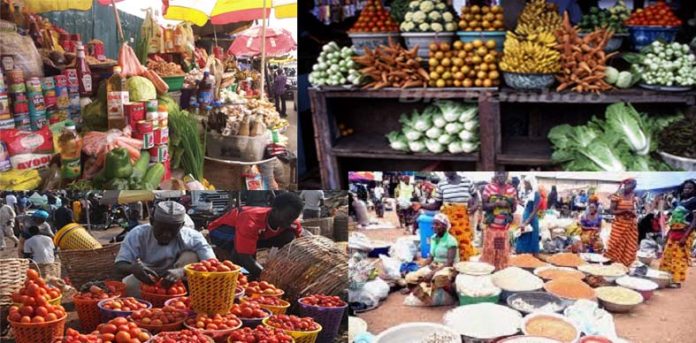Food inflation in Nigeria has surged to 40.66% in May 2024, making it increasingly difficult for Nigerians to afford basic meals.
Prime Business Africa reports a notable rise in food prices, indicating a steady increase in the cost of living.
Analysis of Rising Costs
According to the latest Consumer Price Index and Inflation report released by the National Bureau of Statistics (NBS), the cost of food rose by 61% from 25.25% in June 2023 to 40.66% in May 2024.
This steady rise underscores the growing financial burden on Nigerian households.
CPI Measures and Inflation Rate
The Consumer Price Index (CPI) measures the average change over time in the prices of goods and services consumed for day-to-day living. On Saturday, the NBS disclosed that headline inflation moved by 0.26% to 33.95% in May from 33.69% recorded in April.
The report noted that inflation has climbed to a 28-year high since March 1996, driven by higher food and transport prices.
NBS Report Highlights
The NBS report stated, “In May 2024, the headline inflation rate increased to 33.95% relative to the April 2024 headline inflation rate, which was 33.69%.” Major contributing items to headline inflation in May 2024 include food and non-alcoholic beverages (17.59%), housing, water, electricity, gas, and other fuels (5.68%), and clothing and footwear (2.60%).
Breakdown of Food Price Increases
A detailed breakdown shows that food prices have steadily increased from 25.25% in June 2023 to 40.66% in May 2024. The price of food commodities such as semovita, oat flakes, yam flour, garri, beans, Irish potatoes, yam, and water yam has contributed to the year-on-year increase in food inflation.
Impact on Households
The NBS highlighted that Bauchi, Kogi, and Oyo are Nigeria’s three most expensive states on a year-on-year basis after recording the highest All-Items Inflation in May 2024.
Bauchi recorded an inflation rate of 42.30%, Kogi 39.38%, and Oyo 37.73%. On the other hand, Borno (25.97%), Benue (27.74%), and Delta (28.67%) recorded the slowest rise in headline inflation on a year-on-year basis.
Economic and Policy Factors
In recent years, food prices have been rising across Nigeria, worsened by government policies such as the removal of petrol subsidies. The upward trend in prices has weakened the purchasing power of many citizens, making it difficult for households to afford daily meals.
At the March Monetary Policy Committee meeting, Central Bank Governor Olayemi Cardoso stated that government purchases of foodstuffs as palliatives contribute to soaring food inflation.
Expert Opinions
Economist Shadrach Israel from Lotus Beta Analytics expressed concern about the alarming rise in inflation rates, stating, “The surge in annual inflation rate from 21% to over 30% in just a year, and the persistent 60% food inflation rate, are clear indicators of underlying structural issues in the economy.” Israel urged the government to implement a multi-pronged approach to address inflation, including monetary policy tightening, supply-side reforms, and social protection programs.
Recommendations for the Government
Israel emphasized, “The government must take immediate action to restore the purchasing power of its citizens and promote economic growth and stability. The fact that food prices have increased by 50% compared to last year is particularly concerning, as food is a significant component of household expenditure in Nigeria.”
Addressing Structural Issues
Development economist Jonathan Thomas highlighted the impact of inflation on social events like the Sallah celebration. “The significant decrease in purchasing power has made it challenging for Nigerians to afford necessities, dampening the spirit of the celebration,” Thomas said.
Economic and Policy Factors
In recent years, food prices have been rising across Nigeria, worsened by government policies such as the removal of petrol subsidies. The upward trend in prices has weakened the purchasing power of many citizens, making it difficult for households to afford daily meals.
At the March Monetary Policy Committee meeting, Central Bank Governor Olayemi Cardoso stated that government purchases of foodstuffs as palliatives contribute to soaring food inflation.
Expert Opinions
Economist Shadrach Israel from Lotus Beta Analytics expressed concern about the alarming rise in inflation rates, stating, “The surge in annual inflation rate from 21% to over 30% in just a year, and the persistent 60% food inflation rate, are clear indicators of underlying structural issues in the economy.” Israel urged the government to implement a multi-pronged approach to address inflation, including monetary policy tightening, supply-side reforms, and social protection programs.
Recommendations for the Government
Israel emphasized, “The government must take immediate action to restore the purchasing power of its citizens and promote economic growth and stability. The fact that food prices have increased by 50% compared to last year is particularly concerning, as food is a significant component of household expenditure in Nigeria.”
Addressing Structural Issues
Development economist Jonathan Thomas highlighted the impact of inflation on social events like the Sallah celebration. “The significant decrease in purchasing power has made it challenging for Nigerians to afford necessities, dampening the spirit of the celebration,” Thomas said.
He also noted that high insecurity, which has displaced many farmers, is a significant structural issue that needs to be addressed.
Nigeria must tackle insecurity and promote economic diversification to reduce vulnerability to external shocks and achieve sustainable growth. The government must prioritize economic reforms to ensure a more prosperous and stable future for Nigerians.

























